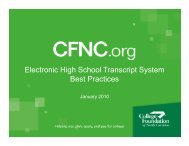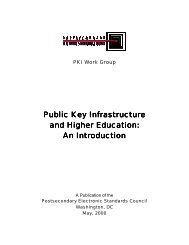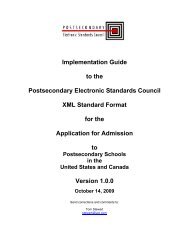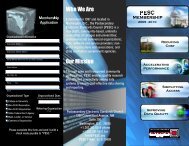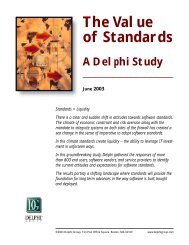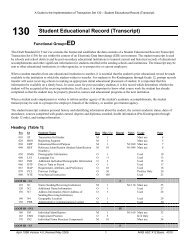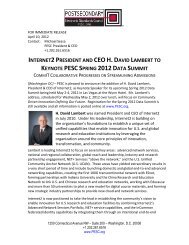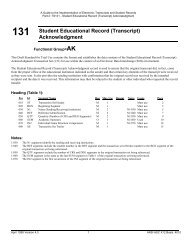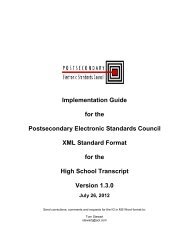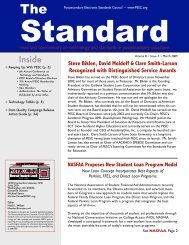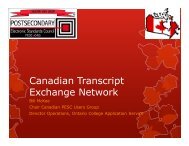February 2013 - PESC
February 2013 - PESC
February 2013 - PESC
You also want an ePaper? Increase the reach of your titles
YUMPU automatically turns print PDFs into web optimized ePapers that Google loves.
Past winners of <strong>PESC</strong>’s Annual Best Practices Competition include:<br />
2011<br />
US Department of Education, NCES<br />
Common Education Data Standards – CEDS<br />
2010<br />
South Carolina<br />
Transfer & Articulation Center – SC TRAC<br />
2009<br />
College Foundation of North Carolina<br />
Electronic High School Transcript System<br />
2008<br />
California Community College System<br />
e-Transcript California and<br />
University System of Georgia Board of Regents<br />
High School & Postsecondary XML Transcript<br />
Implementation<br />
2007<br />
Sinclair Community College & Wright State University<br />
Exchange of E-Transcripts via Ohio Board of Regents<br />
Articulation & Transfer Clearinghouse<br />
2006<br />
Data Quality Campaign – DQC<br />
Using Data to Improve Student Achievement<br />
EXPERIENCE. THE DIFFERENCE.<br />
2005<br />
NCHELP Electronic standards committee<br />
CRC Beta Test<br />
2004<br />
US Department of Education, FSA<br />
XML Registry & Repository for the Education Community<br />
2003<br />
SIF Association<br />
SIF Specification<br />
2002<br />
ELM Resources<br />
ELMnet and<br />
NCHELP Meteor Advisory Team<br />
Meteor<br />
2001<br />
NCHELP Electronic Standards Committee<br />
Common Account Maintenance – CAM<br />
2000<br />
University of Northern Iowa<br />
EDI Bridge<br />
1999<br />
Ontario Universities’ Application Centre – OUAC<br />
Model of Electronic Standardization Initiative<br />
About <strong>PESC</strong><br />
Established in 1997 and headquartered in Washington, D.C., <strong>PESC</strong> is a non-profit, community-based, 501 (c)(3)<br />
umbrella association of colleges and universities; college and university systems; professional and commercial<br />
organizations; data, software and service providers; non-profit organizations and associations; and state and federal<br />
government agencies. Through open and transparent community participation, <strong>PESC</strong> enables cost-effective<br />
connectivity between data systems to accelerate performance and service, to simplify data access and research, and<br />
to improve data quality along the higher education lifecycle.<br />
<strong>PESC</strong> envisions national and international interoperability, that is a trustworthy, inter-connected environment built by<br />
and between communities of interest in which data flows seamlessly from one system to another and throughout the<br />
entire eco-system when and where needed without compatibility barriers but in a safe, secure, reliable, and efficient<br />
manner. To achieve the mission and the vision, <strong>PESC</strong> organizes activities to: accelerate performance and service,<br />
reduce cost, lead collaborative development, set and maintain common data standards, promote best practices, link<br />
public and private sectors, and serve as data experts.<br />
While <strong>PESC</strong> promotes the implementation and usage of data exchange standards, <strong>PESC</strong> does not set (create or<br />
establish) policies related to privacy and security. Organizations and entities using <strong>PESC</strong> standards and services<br />
should ensure they comply with FERPA and all local, state, federal and international rules on privacy and security as<br />
applicable.<br />
More information about <strong>PESC</strong> can be found at http://www.<strong>PESC</strong>.org.<br />
# # #<br />
1250 Connecticut Avenue NW – Suite 200 – Washington, D.C. 20036<br />
+1.202.261.6516<br />
www.<strong>PESC</strong>.org



